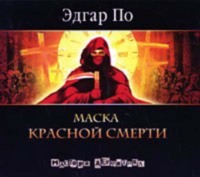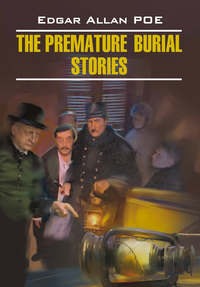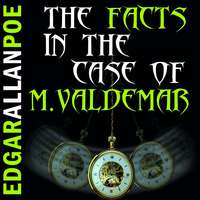 полная версия
полная версияThe Complete Stories of Edgar Allan Poe
“Yes – have changed very much as you see!” chimed in the whole company at once.
“Hold your tongues, every one of you!” said my host, in a great rage. Whereupon the whole company maintained a dead silence for nearly a minute. As for one lady, she obeyed Monsieur Maillard to the letter, and thrusting out her tongue, which was an excessively long one, held it very resignedly, with both hands, until the end of the entertainment.
“And this gentlewoman,” said I, to Monsieur Maillard, bending over and addressing him in a whisper – “this good lady who has just spoken, and who gives us the cock-a-doodle-de-doo – she, I presume, is harmless – quite harmless, eh?”
“Harmless!” ejaculated he, in unfeigned surprise, “why – why what can you mean?”
“Only slightly touched?” said I, touching my head. “I take it for granted that she is not particularly – not dangerously affected, eh?”
“Mon dieu! what is it you imagine? This lady, my particular old friend, Madame Joyeuse, is as absolutely sane as myself. She has her little eccentricities, to be sure – but then, you know, all old women – all very old women are more or less eccentric!”
“To be sure,” said I, – “to be sure – and then the rest of these ladies and gentlemen —”
“Are my friends and keepers,” interupted Monsieur Maillard, drawing himself up with hauteur – “my very good friends and assistants.”
“What! all of them?” I asked – “the women and all?”
“Assuredly,” he said – “we could not do at all without the women; they are the best lunatic nurses in the world; they have a way of their own, you know; their bright eyes have a marvellous effect; – something like the fascination of the snake, you know.”
“To be sure,” said I – “to be sure! They behave a little odd, eh? – they are a little queer, eh? – don’t you think so?”
“Odd! – queer! – why, do you really think so? We are not very prudish, to be sure, here in the South – do pretty much as we please – enjoy life, and all that sort of thing, you know —”
“To be sure,” said I – “to be sure.”
And then, perhaps, this Clos de Vougeôt is a little heady, you know – a little strong – you understand, eh?”
“To be sure,” said I – “to be sure. By-the-by, monsieur, did I understand you to say that the system you have adopted, in place of the celebrated soothing system, was one of very rigorous severity?”
“By no means. Our confinement is necessarily close; but the treatment – the medical treatment, I mean – is rather agreeable to the patients than otherwise.”
“And the new system is one of your own invention?”
“Not altogether. Some portions of it are referable to Professor Tarr, of whom you have, necessarily, heard; and, again, there are modifications in my plan which I am happy to acknowledge as belonging of right to the celebrated Fether, with whom, if I mistake not, you have the honor of an intimate acquaintance.”
“I am quite ashamed to confess,” I replied, “that I have never even heard the name of either gentleman before.”
“Good Heavens!” ejaculated my host, drawing back his chair abruptly, and uplifting his hands. “I surely do not hear you aright! You did not intend to say, eh? that you had never heard either of the learned Doctor Tarr, or of the celebrated Professor Fether?”
“I am forced to acknowledge my ignorance,” I replied; “but the truth should be held inviolate above all things. Nevertheless, I feel humbled to the dust, not to be acquainted with the works of these, no doubt, extraordinary men. I will seek out their writings forthwith, and peruse them with deliberate care. Monsieur Maillard, you have really – I must confess it – you have really – made me ashamed of myself!”
And this was the fact.
“Say no more, my good young friend,” he said kindly, pressing my hand – “join me now in a glass of Sauterne.”
We drank. The company followed our example, without stint. They chatted – they jested – they laughed – they perpetrated a thousand absurdities – the fiddles shrieked – the drum row-de-dowed – the trombones bellowed like so many brazen bulls of Phalaris – and the whole scene, growing gradually worse and worse, as the wines gained the ascendancy, became at length a sort of Pandemonium in petto. In the meantime, Monsieur Maillard and myself, with some bottles of Sauterne and Vougeôt between us, continued our conversation at the top of the voice. A word spoken in an ordinary key stood no more chance of being heard than the voice of a fish from the bottom of Niagra Falls.
“And, sir,” said I, screaming in his ear, “you mentioned something before dinner, about the danger incurred in the old system of soothing. How is that?”
“Yes,” he replied, “there was, occasionally, very great danger indeed. There is no accounting for the caprices of madmen; and, in my opinion, as well as in that of Doctor Tarr and Professor Fether, it is never safe to permit them to run at large unattended. A lunatic may be’soothed,’ as it is called, for a time, but, in the end, he is very apt to become obstreperous. His cunning, too, is proverbial, and great. If he has a project in view, he conceals his design with a marvellous wisdom; and the dexterity with which he counterfeits sanity, presents, to the metaphysician, one of the most singular problems in the study of mind. When a madman appears thoroughly sane, indeed, it is high time to put him in a straight jacket.”
“But the danger, my dear sir, of which you were speaking – in your own experience – during your control of this house – have you had practical reason to think liberty hazardous, in the case of a lunatic?”
“Here? – in my own experience? – why, I may say, yes. For example: – no very long while ago, a singular circumstance occurred in this very house. The’soothing system,’ you know, was then in operation, and the patients were at large. They behaved remarkably well – especially so – any one of sense might have known that some devilish scheme was brewing from that particular fact, that the fellows behaved so remarkably well. And, sure enough, one fine morning the keepers found themselves pinioned hand and foot, and thrown into the cells, where they were attended, as if they were the lunatics, by the lunatics themselves, who had usurped the offices of the keepers.”
“You don’t tell me so! I never heard of anything so absurd in my life!”
“Fact – it all came to pass by means of a stupid fellow – a lunatic – who, by some means, had taken it into his head that he had invented a better system of government than any ever heard of before – of lunatic government, I mean. He wished to give his invention a trial, I suppose – and so he persuaded the rest of the patients to join him in a conspiracy for the overthrow of the reigning powers.”
“And he really succeeded?”
“No doubt of it. The keepers and kept were soon made to exchange places. Not that exactly either – for the madmen had been free, but the keepers were shut up in cells forthwith, and treated, I am sorry to say, in a very cavalier manner.”
“But I presume a counter revolution was soon effected. This condition of things could not have long existed. The country people in the neighborhood – visitors coming to see the establishment – would have given the alarm.”
“There you are out. The head rebel was too cunning for that. He admitted no visitors at all – with the exception, one day, of a very stupid-looking young gentleman of whom he had no reason to be afraid. He let him in to see the place – just by way of variety, – to have a little fun with him. As soon as he had gammoned him sufficiently, he let him out, and sent him about his business.”
“And how long, then, did the madmen reign?”
“Oh, a very long time, indeed – a month certainly – how much longer I can’t precisely say. In the mean time, the lunatics had a jolly season of it – that you may swear. They doffed their own shabby clothes, and made free with the family wardrobe and jewels. The cellars of the chateau were well stocked with wine; and these madmen are just the devils that know how to drink it. They lived well, I can tell you.”
“And the treatment – what was the particular species of treatment which the leader of the rebels put into operation?”
“Why, as for that, a madman is not necessarily a fool, as I have already observed; and it is my honest opinion that his treatment was a much better treatment than that which it superseded. It was a very capital system indeed – simple – neat – no trouble at all – in fact it was delicious – it was —”
Here my host’s observations were cut short by another series of yells, of the same character as those which had previously disconcerted us. This time, however, they seemed to proceed from persons rapidly approaching.
“Gracious Heavens!” I ejaculated – “the lunatics have most undoubtedly broken loose.”
“I very much fear it is so,” replied Monsieur Maillard, now becoming excessively pale. He had scarcely finished the sentence, before loud shouts and imprecations were heard beneath the windows; and, immediately afterward, it became evident that some persons outside were endeavoring to gain entrance into the room. The door was beaten with what appeared to be a sledge-hammer, and the shutters were wrenched and shaken with prodigious violence.
A scene of the most terrible confusion ensued. Monsieur Maillard, to my excessive astonishment, threw himself under the sideboard. I had expected more resolution at his hands. The members of the orchestra, who, for the last fifteen minutes, had been seemingly too much intoxicated to do duty, now sprang all at once to their feet and to their instruments, and, scrambling upon their table, broke out, with one accord, into, “Yankee Doodle,” which they performed, if not exactly in tune, at least with an energy superhuman, during the whole of the uproar.
Meantime, upon the main dining-table, among the bottles and glasses, leaped the gentleman who, with such difficulty, had been restrained from leaping there before. As soon as he fairly settled himself, he commenced an oration, which, no doubt, was a very capital one, if it could only have been heard. At the same moment, the man with the tee-totum predilection, set himself to spinning around the apartment, with immense energy, and with arms outstretched at right angles with his body; so that he had all the air of a tee-totum in fact, and knocked every body down that happened to get in his way. And now, too, hearing an incredible popping and fizzing of champagne, I discovered at length, that it proceeded from the person who performed the bottle of that delicate drink during dinner. And then, again, the frog-man croaked away as if the salvation of his soul depended upon every note that he uttered. And, in the midst of all this, the continuous braying of a donkey arose over all. As for my old friend, Madame Joyeuse, I really could have wept for the poor lady, she appeared so terribly perplexed. All she did, however, was to stand up in a corner, by the fireplace, and sing out incessantly, at the top of her voice, “Cock-a-doodle-de-dooooooh!”
And now came the climax – the catastrophe of the drama. As no resistance, beyond whooping and yelling and cock-a-doodling, was offered to the encroachments of the party without, the ten windows were very speedily, and almost simultaneously, broken in. But I shall never forget the emotions of wonder and horror with which I gazed, when, leaping through these windows, and down among us pêle-mêle, fighting, stamping, scratching, and howling, there rushed a perfect army of what I took to be Chimpanzees, Ourang-Outangs, or big black baboons of the Cape of Good Hope.
I received a terrible beating – after which I rolled under a sofa and lay still. After lying there some fifteen minutes, however, during which time I listened with all my ears to what was going on in the room, I came to some satisfactory dénouement of this tragedy. Monsieur Maillard, it appeared, in giving me the account of the lunatic who had excited his fellows to rebellion, had been merely relating his own exploits. This gentleman had, indeed, some two or three years before, been the superintendent of the establishment; but grew crazy himself, and so became a patient. This fact was unknown to the travelling companion who introduced me. The keepers, ten in number, having been suddenly overpowered, were first well tarred, then carefully feathered, and then shut up in underground cells. They had been so imprisoned for more than a month, during which period Monsieur Maillard had generously allowed them not only the tar and feathers (which constituted his “system”), but some bread and abundance of water. The latter was pumped on them daily. At length, one escaping through a sewer, gave freedom to all the rest.
The “soothing system,” with important modifications, has been resumed at the chateau; yet I cannot help agreeing with Monsieur Maillard, that his own “treatment” was a very capital one of its kind. As he justly observed, it was “simple – neat – and gave no trouble at all – not the least.”
I have only to add that, although I have searched every library in Europe for the works of Doctor Tarr and Professor Fether, I have, up to the present day, utterly failed in my endeavors at procuring an edition.
THE END
A Tale of the Ragged Mountains (1844)
During the fall of the year 1827, while residing near Charlottesville, Virginia, I casually made the acquaintance of Mr. Augustus Bedloe. This young gentleman was remarkable in every respect, and excited in me a profound interest and curiosity. I found it impossible to comprehend him either in his moral or his physical relations. Of his family I could obtain no satisfactory account. Whence he came, I never ascertained. Even about his age – although I call him a young gentleman – there was something which perplexed me in no little degree. He certainly seemed young – and he made a point of speaking about his youth – yet there were moments when I should have had little trouble in imagining him a hundred years of age. But in no regard was he more peculiar than in his personal appearance. He was singularly tall and thin. He stooped much. His limbs were exceedingly long and emaciated. His forehead was broad and low. His complexion was absolutely bloodless. His mouth was large and flexible, and his teeth were more wildly uneven, although sound, than I had ever before seen teeth in a human head. The expression of his smile, however, was by no means unpleasing, as might be supposed; but it had no variation whatever. It was one of profound melancholy – of a phaseless and unceasing gloom. His eyes were abnormally large, and round like those of a cat. The pupils, too, upon any accession or diminution of light, underwent contraction or dilation, just such as is observed in the feline tribe. In moments of excitement the orbs grew bright to a degree almost inconceivable; seeming to emit luminous rays, not of a reflected, but of an intrinsic lustre, as does a candle or the sun; yet their ordinary condition was so totally vapid, filmy and dull, as to convey the idea of the eyes of a long-interred corpse.
These peculiarities of person appeared to cause him much annoyance, and he was continually alluding to them in a sort of half explanatory, half apologetic strain, which, when I first heard it, impressed me very painfully. I soon, however, grew accustomed to it, and my uneasiness wore off. It seemed to be his design rather to insinuate than directly to assert that, physically, he had not always been what he was – that a long series of neuralgic attacks had reduced him from a condition of more than usual personal beauty, to that which I saw. For many years past he had been attended by a physician, named Templeton – an old gentleman, perhaps seventy years of age – whom he had first encountered at Saratoga, and from whose attention, while there, he either received, or fancied that he received, great benefit. The result was that Bedloe, who was wealthy, had made an arrangement with Dr. Templeton, by which the latter, in consideration of a liberal annual allowance, had consented to devote his time and medical experience exclusively to the care of the invalid.
Doctor Templeton had been a traveller in his younger days, and at Paris, had become a convert, in great measure, to the doctrines of Mesmer. It was altogether by means of magnetic remedies that he had succeeded in alleviating the acute pains of his patient; and this success had very naturally inspired the latter with a certain degree of confidence in the opinions from which the remedies had been educed. The Doctor, however, like all enthusiasts, had struggled hard to make a thorough convert of his pupil, and finally so far gained his point as to induce the sufferer to submit to numerous experiments. – By a frequent repetition of these, a result had arisen, which of late days has become so common as to attract little or no attention, but which, at the period of which I write, had very rarely been known in America. I mean to say, that between Doctor Templeton and Bedloe there had grown up, little by little, a very distinct and strongly marked rapport, or magnetic relation. I am not prepared to assert, however, that this rapport extended beyond the limits of the simple sleep-producing power; but this power itself had attained great intensity. At the first attempt to induce the magnetic somnolency, the mesmerist entirely failed. In the fifth or sixth he succeeded very partially, and after long continued effort. Only at the twelfth was the triumph complete. After this the will of the patient succumbed rapidly to that of the physician, so that, when I first became acquainted with the two, sleep was brought about almost instantaneously, by the mere volition of the operator, even when the invalid was unaware of his presence. It is only now, in the year 1845, when similar miracles are witnessed daily by thousands, that I dare venture to record this apparent impossibility as a matter of serious fact.
The temperament of Bedloe was, in the highest degree, sensitive, excitable, enthusiastic. His imagination was singularly vigorous and creative; and no doubt it derived additional force from the habitual use of morphine, which he swallowed in great quantity, and without which he would have found it impossible to exist. It was his practice to take a very large dose of it immediately after breakfast, each morning – or rather immediately after a cup of strong coffee, for he ate nothing in the forenoon – and then set forth alone, or attended only by a dog, upon a long ramble among the chain of wild and dreary hills that lie westward and southward of Charlottesville, and are there dignified by the title of the Ragged Mountains.
Upon a dim, warm, misty day, towards the close of November, and during the strange interregnum of the seasons which in America is termed the Indian Summer, Mr. Bedloe departed as usual, for the hills. The day passed, and still he did not return.
About eight o’clock at night, having become seriously alarmed at his protracted absence, we were about setting out in search of him, when he unexpectedly made his appearance, in health no worse than usual, and in rather more than ordinary spirits. The account which he gave of his expedition, and of the events which had detained him, was a singular one indeed.
“You will remember,” said he, “that it was about nine in the morning when I left Charlottesville. I bent my steps immediately to the mountains, and, about ten, entered a gorge which was entirely new to me. I followed the windings of this pass with much interest. – The scenery which presented itself on all sides, although scarcely entitled to be called grand, had about it an indescribable and to me a delicious aspect of dreary desolation. The solitude seemed absolutely virgin. I could not help believing that the green sods and the gray rocks upon which I trod, had been trodden never before by the foot of a human being. So entirely secluded, and in fact inaccessible, except through a series of accidents, is the entrance of the ravine, that it is by no means impossible that I was indeed the first adventurer – the very first and sole adventurer who had ever penetrated its recesses.
“The thick and peculiar mist, or smoke, which distinguishes the Indian Summer, and which now hung heavily over all objects, served, no doubt, to deepen the vague impressions which these objects created. So dense was this pleasant fog, that I could at no time see more than a dozen yards of the path before me. This path was excessively sinuous, and as the sun could not be seen, I soon lost all idea of the direction in which I journeyed. In the meantime the morphine had its customary effect – that of enduing all the external world with an intensity of interest. In the quivering of a leaf – in the hue of a blade of grass – in the shape of a trefoil – in the humming of a bee – in the gleaming of a dew-drop – in the breathing of the wind – in the faint odors that came from the forest – there came a whole universe of suggestion – a gay and motley train of rhapsodical and immethodical thought.
“Busied in this, I walked on for several hours, during which the mist deepened around me to so great an extent, that at length I was reduced to an absolute groping of the way. And now an indescribable uneasiness possessed me – a species of nervous hesitation and tremor. – I feared to tread, lest I should be precipitated into some abyss. I remembered, too, strange stories told about these Ragged Hills, and of the uncouth and fierce races of men who tenanted their groves and caverns. A thousand vague fancies oppressed and disconcerted me – fancies the more distressing because vague. Very suddenly my attention was arrested by the loud beating of a drum.
“My amazement was, of course, extreme. A drum in these hills was a thing unknown. I could not have been more surprised at the sound of the trump of the Archangel. But a new and still more astounding source of interest and perplexity arose. There came a wild rattling or jingling sound, as if of a bunch of large keys – and upon the instant a dusky-visaged and half-naked man rushed past me with a shriek. He came so close to my person that I felt his hot breath upon my face. He bore in one hand an instrument composed of an assemblage of steel rings, and shook them vigorously as he ran. Scarcely had he disappeared in the mist, before, panting after him, with open mouth and glaring eyes, there darted a huge beast. I could not be mistaken in its character. It was a hyena.
“The sight of this monster rather relieved than heightened my terrors – for I now made sure that I dreamed, and endeavored to arouse myself to waking consciousness. I stepped boldly and briskly forward. I rubbed my eyes. I called aloud. I pinched my limbs. A small spring of water presented itself to my view, and here, stooping, I bathed my hands and my head and neck. This seemed to dissipate the equivocal sensations which had hitherto annoyed me. I arose, as I thought, a new man, and proceeded steadily and complacently on my unknown way.
“At length, quite overcome by exertion, and by a certain oppressive closeness of the atmosphere, I seated myself beneath a tree. Presently there came a feeble gleam of sunshine, and the shadow of the leaves of the tree fell faintly but definitely upon the grass. At this shadow I gazed wonderingly for many minutes. Its character stupified me with astonishment. I looked upward. The tree was a palm.
“I now arose hurriedly, and in a state of fearful agitation – for the fancy that I dreamed would serve me no longer. I saw – I felt that I had perfect command of my senses – and these senses now brought to my soul a world of novel and singular sensation. The heat became all at once intolerable. A strange odor loaded the breeze. – A low continuous murmur, like that arising from a full, but gently flowing river, came to my ears, intermingled with the peculiar hum of multitudinous human voices.
“While I listened in an extremity of astonishment which I need not attempt to describe, a strong and brief gust of wind bore off the incumbent fog as if by the wand of an enchanter.
“I found myself at the foot of a high mountain, and looking down into a vast plain, through which wound a majestic river. On the margin of this river stood an Eastern-looking city, such as we read of in the Arabian Tales, but of a character even more singular than any there described. From my position, which was far above the level of the town, I could perceive its every nook and corner, as if delineated on a map. The streets seemed innumerable, and crossed each other irregularly in all directions, but were rather long winding alleys than streets, and absolutely swarmed with inhabitants. The houses were wildly picturesque. On every hand was a wilderness of balconies, of verandahs, of minarets, of shrines, and fantastically carved oriels. Bazaars abounded; and in these were displayed rich wares in infinite variety and profusion – silks, muslins, the most dazzling cutlery, the most magnificent jewels and gems. Besides these things, were seen, on all sides, banners and palanquins, litters with stately dames close veiled, elephants gorgeously caparisoned, idols grotesquely hewn, drums, banners and gongs, spears, silver and gilded maces. And amid the crowd, and the clamor, and the general intricacy and confusion – amid the million of black and yellow men, turbaned and robed, and of flowing beard, there roamed a countless multitude of holy filleted bulls, while vast legions of the filthy but sacred ape clambered, chattering and shrieking, about the cornices of the mosques, or clung to the minarets and oriels. From the swarming streets to the banks of the river, there descended innumerable flights of steps leading to bathing places, while the river itself seemed to force a passage with difficulty through the vast fleets of deeply-burthened ships that far and wide encountered its surface. Beyond the limits of the city arose, in frequent majestic groups, the palm and the cocoa, with other gigantic and weird trees of vast age; and here and there might be seen a field of rice, the thatched hut of a peasant, a tank, a stray temple, a gypsy camp, or a solitary graceful maiden taking her way, with a pitcher upon her head, to the banks of the magnificent river.









